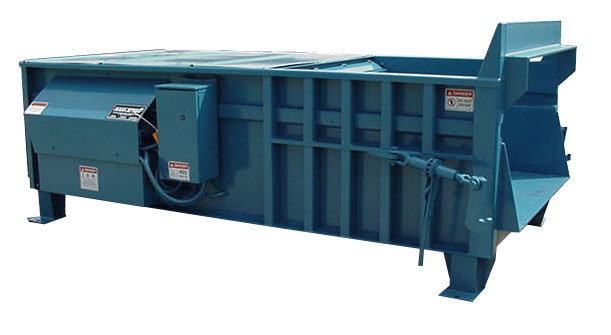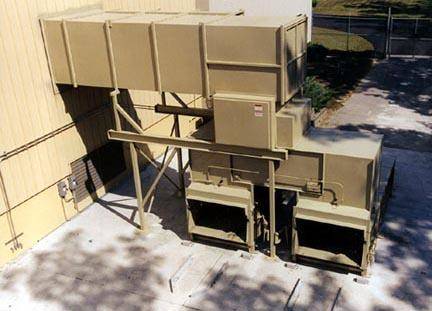The role of Commercial garbage compaction equipment for long-term waste goals
Recognizing the Numerous Uses Waste Devices in the Recycling Sector
The reusing market depends greatly on specialized waste tools to optimize handling and healing. Each device, from shredders to balers, offers a distinctive function that improves general performance. Understanding these roles is essential for boosting sustainability efforts. Commercial garbage compaction equipment. As innovation advances, brand-new developments emerge, promising to change traditional practices. This evolution elevates vital inquiries regarding the future of waste monitoring and its influence on environmental conservation. What modifications exist ahead for this critical industry?
The Function of Shredders in Product Processing
Shredders play an important role in the recycling market by successfully processing various types of waste products. These devices are made to minimize large things, such as plastics, metals, and natural waste, right into smaller sized, workable items. This dimension decrease is necessary for succeeding recycling procedures, as it enables much easier handling and sorting. Along with assisting in recycling, shredders improve safety by reducing the risk of injury related to taking care of bulky waste items.
In addition, shredders add to ecological sustainability by guaranteeing that materials are refined in such a way that optimizes source recovery. They can manage a diverse variety of materials, making them functional tools in waste monitoring facilities. The reliable operation of shredders not only improves the reusing procedure but additionally increases the general efficiency of waste diversion efforts, advertising a circular economic climate. Their importance in product processing can not be overstated, as they work as a fundamental step towards lasting waste monitoring techniques.

Exactly How Balers Enhance Effectiveness in Waste Management
Balers considerably enhance efficiency in waste monitoring by compacting various materials right into bundles, which simplifies storage and transport. By pressing recyclables such as cardboard, plastics, and steels, balers substantially decrease the volume of waste. This compression not just optimizes area in recycling centers but also reduces the number of trips needed to transport products, causing lower fuel prices and reduced environmental influence.
Balers add to enhanced safety and security in waste management procedures. Small bales are much easier to manage and stack, decreasing the threat of mishaps associated with loosened materials. The uniform size of bundles enables more effective packing and discharging processes, simplifying operations within reusing facilities. Additionally, balers can boost the general high quality of recyclables, as effectively compressed products are less most likely to be polluted. Generally, balers play a crucial role in enhancing waste monitoring practices, advertising sustainability in the recycling sector.
Conveyor Systems: Enhancing the Recycling Refine
Including advanced equipment like balers considerably improves waste administration operations, but the performance of the recycling procedure is better enhanced with the usage of conveyor systems. These systems play a crucial function in the smooth transport of materials within recycling centers. By promoting the motion of different waste kinds, conveyor systems reduce manual handling and reduce the risk of contamination during the reusing process.
Conveyor systems can be personalized to fit the distinct layouts and operational requirements of reusing facilities. Their capability to run constantly permits for a steady flow of products, boosting productivity and making sure that sorting and processing tools obtains a consistent supply.
Geared up with features like adjustable rates and automated controls, conveyor systems can enhance the circulation of products, considerably enhancing general effectiveness (Commercial garbage compaction equipment). Subsequently, these systems are crucial in modern recycling procedures, contributing and simplifying processes to effective waste management
Arranging Makers: The Secret to Material Recovery
Arranging machines are vital parts in the reusing industry, substantially improving the performance of material recuperation. These machines play a critical function in the separation of various recyclable products, permitting a streamlined process that takes full advantage of source removal. By using innovative modern website link technologies, such as optical sensors and air classifiers, sorting makers can recognize and classify products based on their size, weight, and composition. This ability guarantees that steels, plastics, and paper products are effectively separated, minimizing contamination and improving the high quality of recycled result.
The procedure of sorting makers considerably minimizes the reliance on manual work, which can be both time-consuming and susceptible to errors - Commercial garbage compaction equipment. Additionally, the automation given by these machines speeds up the general recycling procedure, causing greater throughput and raised functional efficiency. Subsequently, sorting equipments are vital in attaining lasting waste management objectives, allowing the reusing market to successfully recuperate important products while decreasing landfill reliance

Technologies in Waste Tools for a Lasting Future
Current innovations in waste tools are driving the recycling industry toward an extra sustainable future. Innovations such as automated arranging systems, which make use of expert system and artificial intelligence, boost performance by accurately determining and dividing recyclables. This results in greater recovery prices and minimized contamination. In addition, growths in compacting technology enable much more effective transport of materials, decreasing carbon impacts during transportation.
In addition, improvements in shredding equipment improve the handling of intricate products, enabling the recycling of products that were as soon as considered non-recyclable. The integration of renewable resource resources, like solar energy, in waste handling facilities better contributes to sustainability goals. Additionally, developments in waste-to-energy technologies and naturally degradable products are reshaping the landscape of waste management. Collectively, these improvements signify a transformative change within the reusing sector, promoting not just environmental defense yet also financial viability for future generations.
Regularly Asked Inquiries
What Types of Products Can Waste Devices Take Care Of?
The kinds of materials waste equipment can manage consist of plastics, metals, check these guys out paper, glass, and organic waste. Each devices kind is developed for certain products, enhancing efficiency and performance in sorting and processing various waste streams.
How Usually Should Waste Equipment Be Kept?

Exist Security Interest In Using Waste Equipment?
Safety worry about utilizing waste devices include potential injuries from mechanical malfunctions, direct exposure to hazardous products, and insufficient training. Appropriate upkeep, regular evaluations, and worker education and learning are vital to mitigate these risks efficiently in any kind of setting.
What Is the Ordinary Lifespan of Recycling Equipment?
The ordinary life expectancy of reusing equipment usually ranges from 10 to twenty years, depending on elements such as use strength, maintenance practices, and technological developments, which can considerably affect resilience and efficiency over time.
How Is Waste Equipment Powered in Recycling Facilities?
Waste tools in reusing facilities is generally try this web-site powered by electrical power, though some equipments may use alternate energy resources like gas or diesel. This power allows reliable processing and transformation of products for recycling purposes.
Shredders play an essential role in the recycling market by efficiently processing different types of waste products. They can handle a diverse variety of materials, making them versatile tools in waste administration centers. Balers considerably boost performance in waste management by compacting different products right into bales, which streamlines storage and transport. The kinds of products waste tools can take care of include plastics, metals, paper, glass, and natural waste. Safety and security issues with using waste tools consist of potential injuries from mechanical breakdowns, exposure to dangerous products, and inadequate training.